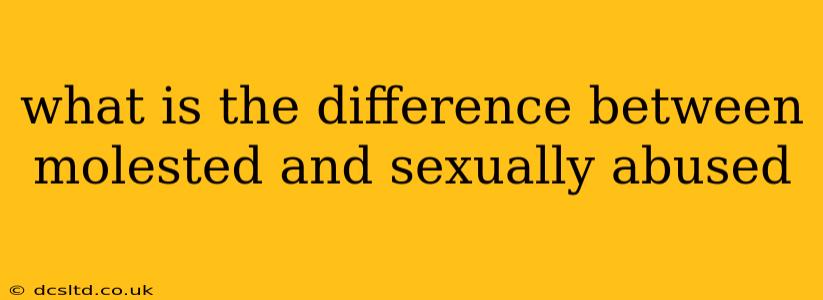What is the Difference Between Molested and Sexually Abused?
The terms "molested" and "sexually abused" are often used interchangeably, leading to confusion. While they both refer to harmful sexual acts against a child or vulnerable adult, there are subtle differences in their connotations and legal implications. Understanding these nuances is crucial for accurate communication and support for survivors.
Are Molestation and Sexual Abuse the Same Thing?
Essentially, molestation is a form of sexual abuse. All instances of molestation constitute sexual abuse, but not all sexual abuse is necessarily labeled molestation. The distinction often lies in the specific acts involved and the context in which they occur.
What Constitutes Molestation?
Molestation typically refers to non-penetrative sexual acts. This might include:
- Touching: Inappropriate touching of genitals, breasts, or other body parts.
- Exposure: Forcing a child or vulnerable adult to witness or endure indecent exposure.
- Kissing: Non-consensual kissing in a sexual manner.
- Fondling: Touching or caressing in a sexual way.
While these acts are undeniably harmful and constitute sexual abuse, the term "molestation" sometimes carries a slightly less severe connotation than "sexual abuse" in casual conversation. However, this is misleading and it's important to remember that molestation is a serious form of abuse with devastating consequences.
What Constitutes Sexual Abuse?
Sexual abuse encompasses a much broader range of harmful sexual acts, including those involved in molestation, and also includes:
- Penetration: Sexual intercourse, anal penetration, or oral sex.
- Sexual exploitation: Using a child or vulnerable adult for sexual gratification through prostitution, pornography, or other exploitative means.
- Coercion and Manipulation: Using force, threats, or manipulation to engage in sexual activity.
- Grooming: The process of building trust with a child or vulnerable adult to facilitate sexual abuse.
Sexual abuse is a comprehensive term that covers a wide spectrum of harmful behaviors, with molestation representing a specific type of sexual abuse that doesn't involve penetration.
What are the Legal Differences?
Legally, the terms may be used differently depending on jurisdiction and specific statutes. Some laws might use "sexual abuse" as a broad umbrella term, encompassing various offenses, while others might have separate legal definitions for different types of sexual offenses, including molestation. The specific charges brought against an offender would depend on the nature and circumstances of the crime.
How Do I Talk About This with Others?
When discussing these issues, it's crucial to use language that is both accurate and sensitive. Avoid minimizing the harm caused by any form of sexual abuse. Using clear and precise language, like "sexual abuse" or describing the specific act(s) involved (e.g., "non-consensual touching"), is usually the best approach. If you are unsure of the correct terminology, consider consulting with a legal professional or a specialist in child sexual abuse.
In conclusion, while the terms are often used interchangeably, understanding the distinctions between "molestation" and "sexual abuse" can help in accurately describing and addressing the severe harm inflicted on survivors. Both constitute serious crimes with long-lasting consequences, demanding compassionate support and appropriate legal action.
